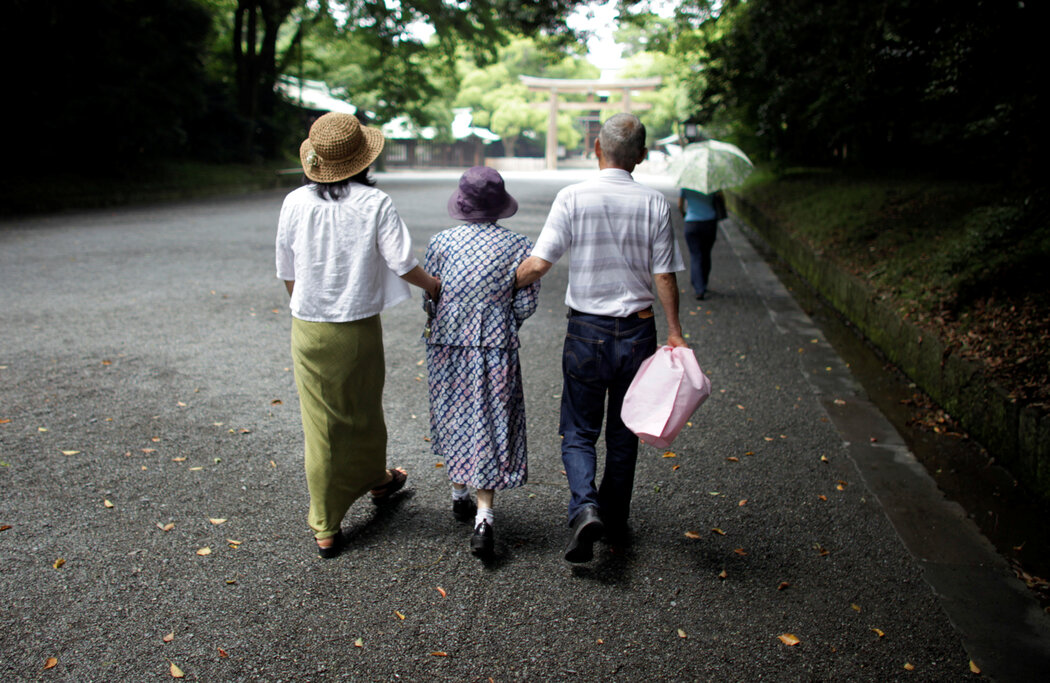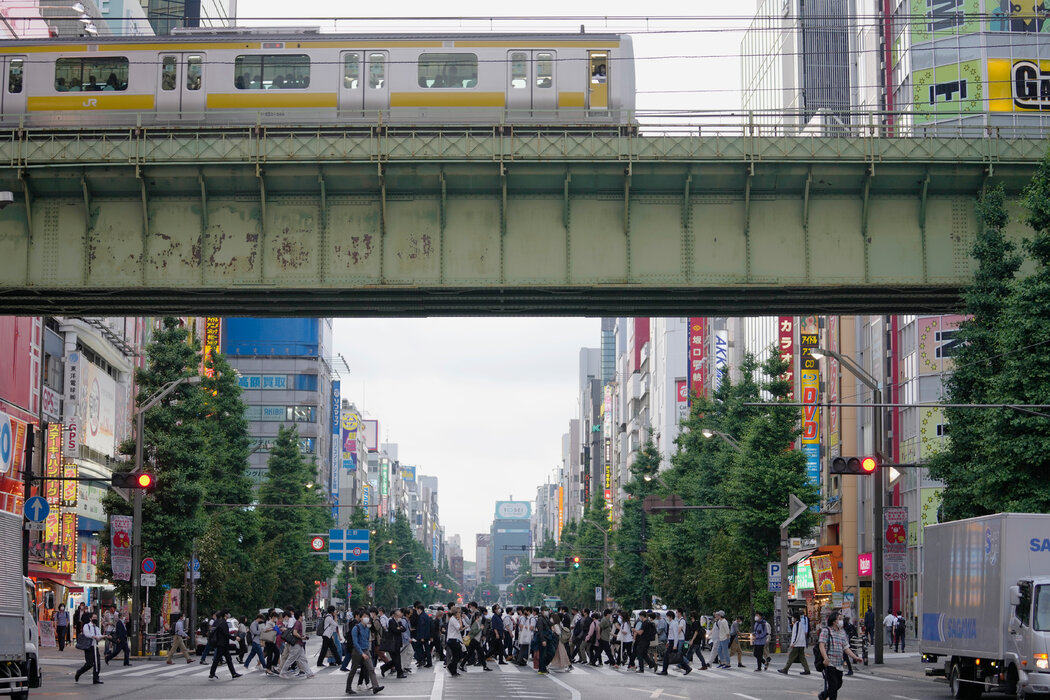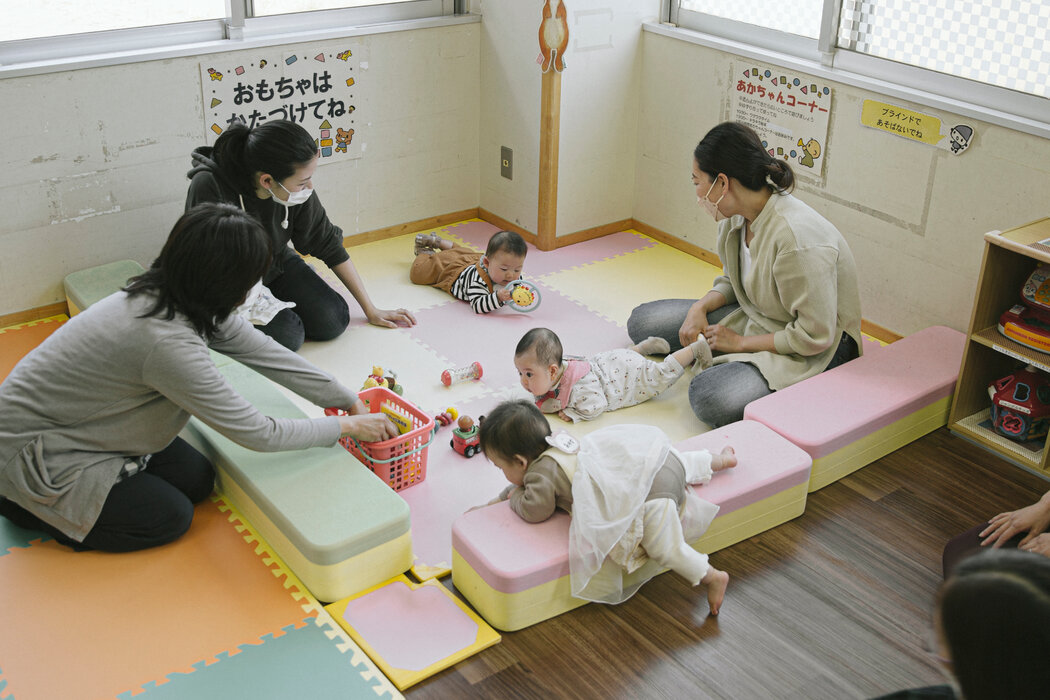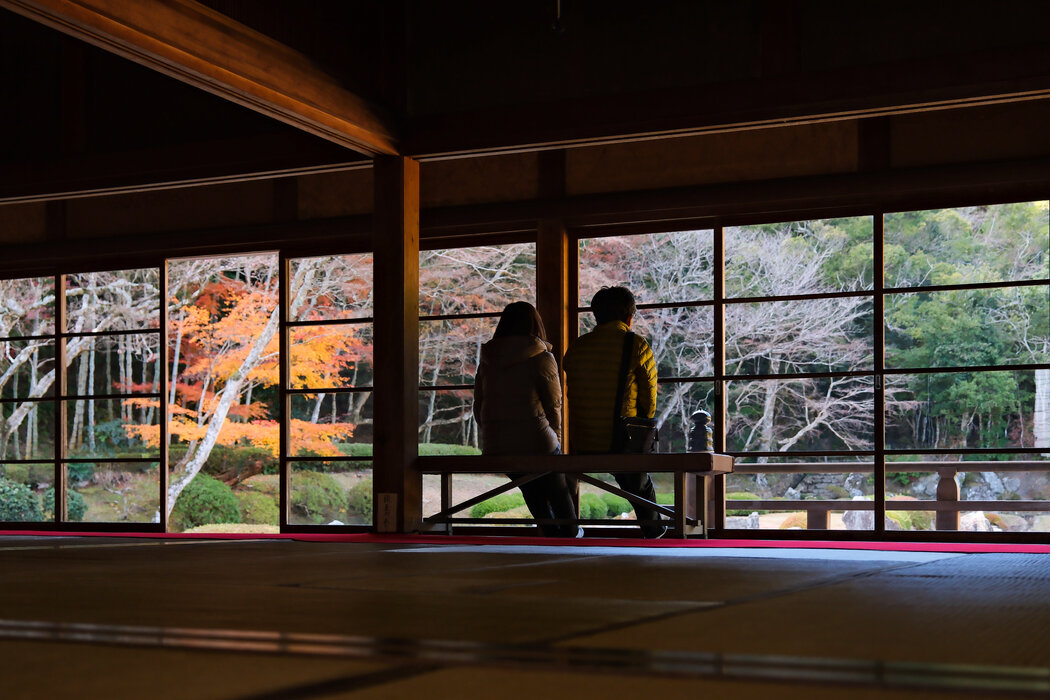


The economy is now in recession after barely growing for decades. The population continues to shrink, with births last year plunging to a nadir. The country’s politics appear frozen as one party holds a virtual lock on power no matter how scandal-tainted and unpopular it becomes.
几十年来经济几乎没有增长,如今陷入衰退。人口继续萎缩,去年的出生率降至最低点。国家政治看起来一潭死水,因为一个政党无论多么丑闻缠身、不得人心,都能牢牢掌握政权。
But not to worry. This is Japan, where all bad news is relative.
但是不用担心。这里是日本,所有的坏消息都是相对的。
Take a look around. There are few signs of the societal discord you might expect in a place with trend lines like Japan’s, such as accumulating garbage, potholes or picket lines. The country remains remarkably stable and cohesive, with little sense of impending doom.
看看周围。在日本,虽然有种种这样的趋势,却几乎看不到社会不和谐的迹象,比如堆积的垃圾、坑洼不平的地面或随处拉起的警戒线。这个国家仍然保持着惊人的稳定和凝聚力,几乎没有末日来临的感觉。
That equanimity reflects a no-need-to-rock-the-boat mind-set: “Shouganai” — “it can’t be helped” — is something of a national refrain.
这种平静反映了人们觉得无需彻底改变的心态:“Shouganai”——“没办法”——是国民口头禅。
It’s easy to see why people might be nonchalant. Unemployment is low, the trains run on time and the cherry blossoms bloom every spring. Tourists are flooding the shrines and shopping districts, and the stock market has hit a record high. Even after some inflation, a bowl of ramen can be had for less than $7, or a multi-plate set lunch for about $12. Housing is generally affordable even in Tokyo, and everybody is covered by national health insurance. Crime is low: In 2022, there were just three gun killings in all of Japan. If you forget your cellphone in a restaurant, chances are it will be there when you return.
不难理解人们为什么如此淡定。失业率很低,火车准点运行,每年春天樱花盛开。游客们涌入神社和购物区,股市创下历史新高。即使在通货膨胀之后,一碗拉面的价格也不到七美元,一份包含几道菜的午餐套餐的价格约为12美元。即使在东京,住房也是普遍负担得起的,而且所有人都有国民健康保险。犯罪率很低:2022年,全日本只发生了三起枪杀案。如果你把手机忘在餐馆里了,很可能回来的时候它还放在那里。
“I am pretty happy with my living conditions,” said Chihiro Tsujimoto, 26, a classical music percussionist who had come out of a movie theater with his sister in Chofu, in western Tokyo, last week. Japanese people, he said, have “given up and feel rather happy as long as their life is full and fine.”
“我对自己的生活条件很满意,”26岁的古典音乐打击乐手辻本千弘(音)说。上周,他和姊妹从东京西部调布的一家电影院出来。他说,日本人已经“放弃了,只要生活充实美好,他们就会感觉相当幸福”。
“I guess Japan is at peace,” he added. “So the young generation doesn’t feel they need to change this country.”
“我觉得日本处于和平状态,”他还说。“所以年轻一代不觉得需要改变这个国家。”
That lulling sense of calm is heightened by an outside world plagued by wars and social challenges.
外面的世界饱受战争和社会挑战的困扰,更加深了这种令人沉醉的平静感。
“I often have business trips to the U.S. and Europe, and feel that the Japanese society and system are very stable compared to other countries with various problems like immigrants, high crime rates and riots,” said Hisashi Miwa, 65, who works for a chemical manufacturer and was out shopping for toilet paper in Setagaya, also in western Tokyo.
“我常去美国和欧洲出差,感觉和其他国家相比,日本的社会和制度非常稳定,其他国家都有移民、高犯罪率和骚乱等各种问题。”65岁的三和久志(音)说。他在一家化学品制造商工作,此时正在同样位于东京西部的世田谷买卫生纸。

Still, beneath Japan’s placid surface, plenty of entrenched problems remain. With its intense work culture and social pressures, Japan is among the unhappiest of developed countries, according to an annual U.N.-backed report, and suicide is a major concern. Gender inequality is deep-rooted and slow to change, and the poverty rate among single-parent households is one of the highest among wealthy nations. Rural areas are rapidly emptying, and an aging population will increasingly add to pension and caregiving burdens.
然而,在平静的表面下,许多根深蒂固的问题依然存在。根据一份联合国资助的年度报告,由于紧张的工作文化和社会压力,日本是发达国家中最不幸福的国家之一,自杀也是一个令人担忧的主要问题。性别不平等根深蒂固,这方面的改变是缓慢的,单亲家庭的贫困率在富裕国家位居前列。农村地区正在迅速空心化,人口老龄化将日益加重养老金和护理负担。
Next year, nearly one in five people in Japan will be 75 or older, a phenomenon that will increasingly expose labor shortages in a country that struggles to accept and integrate immigrants. Already, service gaps are emerging in some of the country’s most cherished institutions.
明年,日本将有近五分之一的人口年龄达到或超过75岁,在这个始终难以接受和融合移民的国家,这一现象将日益暴露出它的劳动力短缺问题。目前,在日本最受推崇的一些机构中,已经出现了服务缺口。
“It takes four or five days to get a letter,” said Sayuri Shirai, a professor of policy management at Keio University, referring to Japan’s postal service, which used to reliably deliver letters one day after they were mailed.
“收到一封信需要四五天的时间,”庆应义塾大学政策管理教授白井小百合(音)说,她指的是日本的邮政服务。过去,该服务在信件寄出后一天内就能可靠地送达。
When she has problems with cable television or other utility services, she said, “sometimes you want to ask questions on the phone, but there are no phone-related services anymore.”
她说,当她遇到有线电视或其他公用事业服务方面的问题时,“有时你想通过电话询问,但现在已经没有与电话相关的服务了。”
“I can really see they don’t have people,” Ms. Shirai said. “The quality of service is no longer so good.”
“确实能看出来他们没有人手,”白井说。“服务质量不再那么好了。”

Inconveniences like those, however, are more an irritation than a sign of imminent societal collapse. Japan’s decline is gradual, and in some ways barely perceptible, after the country rocketed to wealth in the decades following World War II.
然而,像这样的不便更多是一些烦心事,而非社会濒临崩溃的征兆。日本在第二次世界大战后的几十年里迅速达到富裕水平,其衰落是渐进的,在某些方面几乎难以察觉。
The economy — now the world’s fourth largest, after dropping below Germany’s this month — dips up and down but has largely weathered a rate of national debt that is the highest in the world. The population falls by about one-half of 1 percent a year, but Tokyo remains the world’s most populous city, people wait in line for an hour to score a trendy doughnut and reservations at the top restaurants must be made weeks in advance. Prime ministers may come and go, but they are replaceable emissaries of the status quo.
上个月,日本的经济排名下滑至德国之后,成为世界第四大经济体。它的经济起起伏伏,但基本上经受住了世界最高国债率的考验。东京人口每年以0.5%的速度下降,但仍然是世界上人口最多的城市,人们要排一个小时的队才能买到一个“网红”甜甜圈,在顶级餐厅预订座位必须提前几个星期。首相可能来来去去,但他们只是维持现状的使者,是可以随意替换的。
“I think everybody kind of knows what is approaching us, but it is so slow that it is very difficult to somehow advocate a huge change,” said Mieko Nakabayashi, a professor of politics at Waseda University in Tokyo.
东京早稻田大学政治学教授中林美惠子说:“我想,每个人都多少知道,是什么正在向我们逼近,但它来得太慢了,很难以某种方式去倡导一场巨大的变革。”
Even those who think Japan could use a shake-up are more resigned than radicalized.
即使是认为日本需要改革的人,也更多抱着顺其自然而非激进的态度。
“I thought Japanese people were a little more clever, but our economy, which was once said to be first-class, is now second- or third-rate, and our government is perhaps not even fourth- or fifth-rate,” said Fuchi Beppu, 76, a retired hotel worker who was walking near Yokohama Station last week.
“我本以为日本人更聪明一点,但我们的经济曾经被称为一流,现在是二流或三流,我们的政府可能连四流或五流都不算,”76岁的退休酒店工作人员别部富知(音)上周在横滨车站附近散步时说。

He said he felt sorry for his children and grandchildren and the future that awaited them.
他说,他为他的子孙后代以及他们的未来感到遗憾。
“At the end of the day, it is a democracy,” he said. “So I suppose the level of the government reflects the level of the citizens.”
“归根结底,这是一个民主国家,”他说。“所以,我认为政府的水平反映了公民的水平。”
That government, for nearly the entirety of the postwar era, has been led by the Liberal Democratic Party, or L.D.P.
在战后时期,日本政府几乎一直由自民党领导。
The party’s disapproval ratings are now very high — based on one newspaper poll, the highest since 1947. But even when people become frustrated with the L.D.P., they ultimately “don’t care much as long as they can survive and everyday life is not so bad,” said Tsuneo Watanabe, a senior fellow at the Sasakawa Peace Foundation in Tokyo. “That’s why L.D.P. politics is very stable.”
现在该党的支持率非常低,根据一家报纸的民意调查,已经达到1947年以来的最低谷。但是,即使对自民党感到失望,人们终归也“不会太在意,只要能活下去,而且日常生活不那么糟糕就行”,东京笹川和平基金会高级研究员渡边恒雄说。“正因如此,自民党的政治非常稳定。”
The current disapproval ratings reflect the public’s exasperation with a financial scandal that has gripped the Japanese media but has been too arcane for most of the general public to follow in detail.
目前的支持率反映了公众对一桩金融丑闻的愤怒。虽然是日本媒体关注的焦点,但由于情节过于复杂难明,大多数民众也只是知道个大概。

Allegations began to emerge late last fall that several factions within the L.D.P. had failed to record the full amount of proceeds from ticket sales to political fund-raisers. In some cases, it appeared that members of Parliament were taking kickbacks from some of the sales, and prosecutors have indicted three lawmakers, accusing them of violations of the Political Funds Control Act.
去年秋末开始出现指控,称自民党内部的几个派系没有将政治筹款活动的门票销售收入全部入账。在某些情况下,国会议员似乎从部分收入中收取了回扣,检察官起诉了三名议员,指控他们违反了《政治资金规正法》。
Yet unlike in other countries where politicians have been accused of extravagant acts of corruption, the Japanese media has dug up relatively tame evidence of campaign gifts and dinners. Some news reports suggested that one lawmaker may have used the political funds to buy books, including thousands of copies of one title he wrote himself.
然而,与其他国家的政界人士被指控肆无忌惮的腐败不同,日本媒体挖出的竞选礼物和晚宴证据相对不起眼。一些新闻报道称,一名议员可能用政治资金购买书籍,其中包括数千册他自己撰写的书。
With the political opposition in disarray, the L.D.P. appears likely to survive another of its numerous own goals. One reason: Voters are just not very plugged in.
在政治反对派一片混乱的情况下,自民党似乎可以再一次挺过它的众多自摆乌龙。选民的参与度不够是其中的一个原因。
“I don’t know who my mayor is or don’t check the news much,” said Mr. Tsujimoto, the percussionist. “I just watch internet news for stuff like when a new baby of some animal is born at a zoo.”
“我不知道我们的市长是谁,也不怎么看新闻,”打击乐手辻本说。“我只是在网上看一些新闻,比如动物园里有什么动物宝宝出生了。”

Motoko Rich是驻东京记者,领导时报对日本新闻的报道。点击查看更多关于她的信息。
Hisako Ueno自2012年以来一直为时报报道日本的政治、商业、性别、劳工和文化相关新闻。1999年至2009年期间她曾在《洛杉矶时报》东京分社工作。
翻译:晋其角